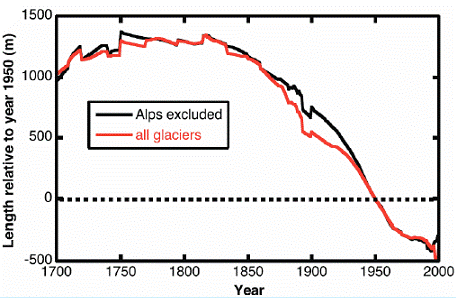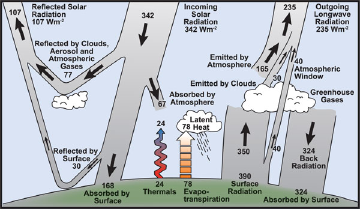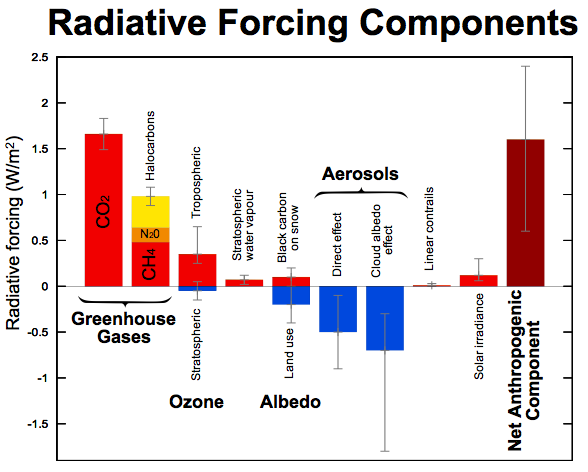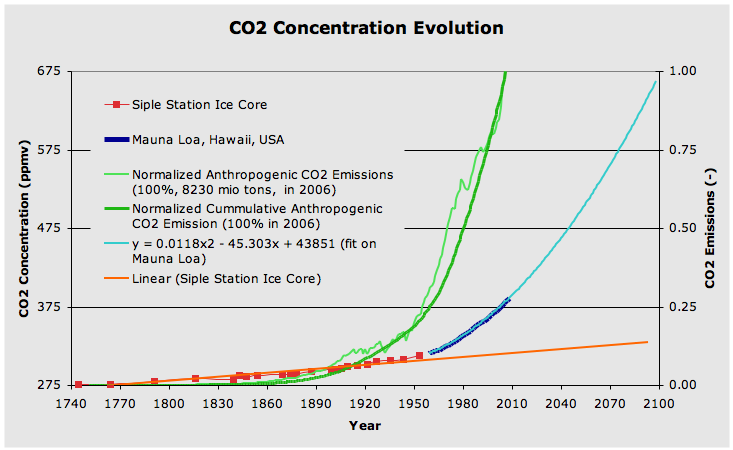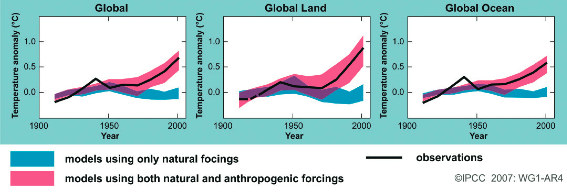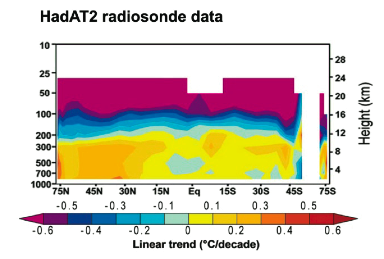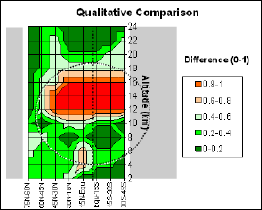This page is a working document. It is in no ways definitive, but represent the state, today of my reflections with regards to global warming. This is available on the web not to be used as reference, or to convince anybody that I am right, but in the opposite so that everybody out there can convince me that I am wrong.
State of today: going forward, but still mostly keywords. Will be completed over the next months...
"Today" is now over one decade ago. Since then, lot's of new evidence has come, which should change the conclusions/reflections. This page is left as is but does not represent anymore the state of knowledge!
Question 1: Is the Earth actually warming?
Question 2: Do anthropogenic factors contribute to global warming?
Question 3: Do both answers above terminate the debate (aka The Science Is Settled)?
Question 4: Is the whole warming due to anthropogenic causes, mostly CO2 (with no other significant natural causes)?
Question 5: Is a reasonable warming actually bad?
Question 6: Is the current climate unprecedented in history?
Question 7: Are the climate feedbacks strongly positive?
Question 8: Should we expect catastrophic antropogenic climate change?
Question 9: Should we take measures to reduce green house gases?
Extra: Who are you, and what qualifications do you have? Should I believe you?
Comments
Interestingly, it is not at all obvious to answer the basic question: what is the temperature on earth? While we can ponctually measure temperature very precisely, we can only guess the temperatures at locations where no thermometer is - right now - measuring.
Earth not being covered by thermometers, there is some form of uncertainty on the data. Several scientific efforts are made to get an approximate measure of the average temperature on earth. Two are mostly based on weather stations and ocean buoys (GISS from the NASA in the US and HADCRUT3 from UEA and MetOffice in the UK). The other two are based on satellite measurements (UAH and RSS, both in the US).
In the following figure, the data (monthly) from those four institutes are plotted:
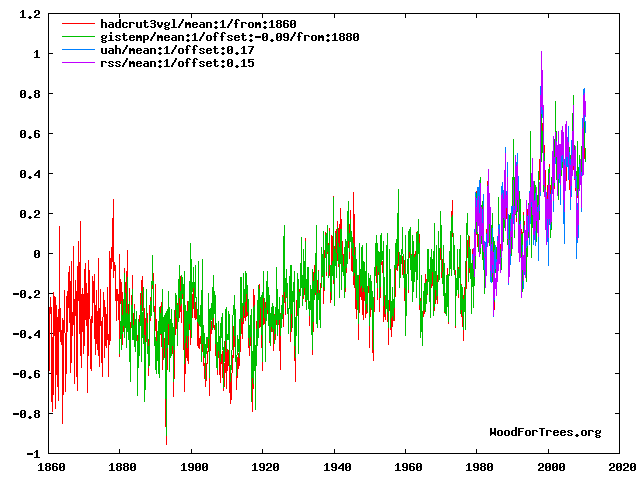
Fig. 1: Raw temperature data 1860-present, monthly; source online plotter at Wood for Trees. Click to zoom in with the latest values.
We can see that based on those data, the fit between methods is quite good; although the methods are quite different, the satallites and the weather station agrees. The picture must therefore be quite correct! A more complete discussion is available on Earth Temperature.
But that is even confirmed by several other indicators. For instance the Sea Level, which increases as the temperature increases (due partly because of melting snow and ice, but mostly because of the thermal expension of the water as the ocean temperature increases):
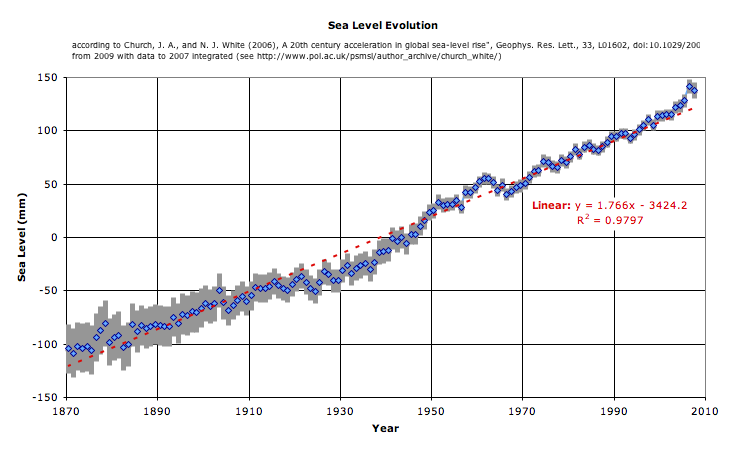
Fig. 2: Sea level with uncertainty bars; source at http://www.pol.ac.uk/psmsl/author_archive/church_white/. Click to zoom in.
Similary, the glaciers have been melting dramatically worldwide as can be seen on the summary picture below:
So I guess everything is telling the same story. The Earth is warming. Using Figure 1, we can estimate that the warming was about 0.8°C since 1900.
Note: There is many discussions about potential errors in the measurements of the temperature (bad located measuring stations, UHI). In my opinion, the fact that the satellites (that may also have errors, but not the same) and the ground measurements agree so well indicates that the errors are efficiently dealt with by the UEA and MetOffice.
The temperature of the Earth is the current state resulting of many energy flows - coming from very different physical processes and hence with different dependance to the temperature - which tend to come to an equilibrium.
To give an example, consider a fontain with a source and an outlet. The level in the fountain will increase until the input (source) is equal to the output (flow through the outlet). If the source increases its flow, the level increases until equilibrium (higher level is higher pressure on the outlet, hence higher outgoing flow). What if the temperature increases? Some water will evaporate, thus leading to a higher rate of "output" - even if the "phenomena" is different - thus decreasing the level. So even if ultimately it has an equilibrium where input = output, changes in conditions impact the level in the fountain. It is similar with temperature and energy flows.
The main energy flows are sketched in the next figure:
So if any of those flows is modified, inbalances will modify the temperature tending to a new equilibrium. The question is whether humankind can modify one of those flows significantly.
The question is not whether we can modify those flows at all, because this is obvious. For instance by burning wood, humans make a new source of heat. Or by building a parking lot (i.e. removing vegetations), we decrease the Evapo-transpiration (but perhaps we increase the thermals?). But are those changes significant, or are they lost in the "noise", i.e. the inherant changes of the system which is never perfectly at equilibrium because of it's complexity (e.g. more or less clouds change the flow of short waves reflected by them).
The values in Figure 4 are given in W/m2. This makes, for instance, an energy output of the surface of 2.66·1017 W for the whole surface of Earth. Now the overall energy demand (whole mankind) is 1.504·1013 W. Assuming the whole energy demand radiates heat (which is of course completely wrong as the energy also delivers a service, such as moving a car) this amounts to 0.0056% of the surface's energy output. So I guess that may answer this particular question - the energy use by humankind is probably not affecting directly very much the temperature (i.e. the heat from your BBQ or your floor heating is not heating Earth. The CO2 resulting from your burning coal or gas is another question, of course).
The IPCC considers that our other example (land use - building a parking lot) does have an impact on the climate (see Albedo below). And list several other effects that do influence the temperature, positively (warmer) as well as negatively (cooler):
The balance is however significantly positive (warmer). Note that the uncertainty bars go from 0.5 to 2.5 W/m2, or from 1 to 5, which shows that determining those numbers is not easy. The Figure 5 shows the by far largest forcings are due to greenhouse gases. But also Figure 4 shows that the largest energy flows are due to greenhouse gases. This is not new science - it is well known that without greenhouse gases, the Earth would be rather inhospitable for life and much cooler.
As it happens, one of those greenhouse gas is CO2, which is nothing else as the product of the combustion of organic material (containing Carbon). And this incudes sugar (when we breath) as well as oil, gas or coal. And we must admit that since the industrial revolution, the energy production did put a lot of CO2 in the air!
According to CDIAC, the anthropogenic emissions of carbon-dioxide since 1751 sum at around 3.3·1014 kg_Carbon. The present weight of carbon-dioxide in the atmosphere is approximatively 8.2·1014 kg_Carbon (based on a concentration of 383 ppmv and an estimation of the weight of the atmosphere). That's 40%. Of course not all the CO2 emitted remains in the atmosphere, by far. A part of it is direclty used by plants that grow faster. Another part is probably dissolved in the oceans. Apparently the view of IPCC is that about 40% of the emissions remain in the atmosphere (on short term).
Taking this into account, in the year 2006 for instance the amount of carbon-dioxide released by manking should be enough to increase the concentration in the air by about 1.6ppm! Based on CO2 concentrations of about 300ppm before industrialization, and a concentration of about 400ppm now (coincidentally an increase of about 40%), that means with a constant rate a doubling of concentration in about a century - but the rate is of course not constant but increasing as can be seen in Figure 6:
All-in-all we have seen several effects that humankind can have on the temperature - there are many others such as creating new clouds which depending on the altitude may warm or cool the planet. In particular the greenhouse gas - CO2 - is produced in significant amount and does have a proven temperature effect. So, while the size of the effect is not proven yet, I guess without doubts manking has an effect on the climate.
So that's it, isn't it?
Humans have an effect on temperature. Temperatures are increasing. The science is settled! Let's stop burning oil for good at once! All further discussion is a crime as the situation is getting worse while we discuss. Doubt is ecocide and skeptics should be shot.
Of course I am joking, but these are conclusions that are not unheared of. Quite often that's how a person skeptical about the AGW (anthropogenic global warming) will be answered... I have to admit I would also have used a polite and slightly more open-ended version of it myself, before I began informing myself in more details.
Of course the Science is not settled, all serious scientists will agree on that. The science is basically never settled. The systems are very complex, chaotic, and experiments are close to impossible (have a second Earth to lend me for a controlled experiment?). So while part of it (as mentioned above: Earth is warming, CO2 is a greenhouse gas) may be virtually certain, some may remain a bit more uncertain. For instance:Is the whole warming due to anthropogenic effects? Most of it?
How much warming can we expect when?
Will the effect of warming lead to catastrophe? When?
Why are those questions important?
We are asked to make a drastic choice for our future, based on a theory that if we don't change, we run forward to a catastrophe... But hey!, we risk irreversible damage to our only planet! Is it ethical to risk the planet of our children just to keep our standard of living?
Some consider that the precautionary principle dictates that we act resolutely even in presence of uncertainty, because of this irreversible damage. Well, I guess we should invest every penny in building a starfleet in case some mean man-eating extraterrestrials come to kick and eat us. Nobody can prove it cannot happen and it would be a major catastrophe as well. Why don't we? Because we consider the probability to be too small. So it is legitimate to insist on obtaining probabilities for global warming as well.
Probabilities may not be necessary when the alternative is almost free. Like: it may rain, let's be on the safe side and take an umbrella - carrying a foldable umbrella in a bag is not a significant cost factor (but you may renounce it if you go jogging because the umbrella will be more a pain). But when it is not free, but costly (such as write off several trillions of dollar of energy and production infrastructure) then like an insurance, one begins to compute probabilities based on the best available information and not base decision on sheer possibilities.
That's why those questions are important!
Deciding on sheer possibilities instead of probabilities would be irresponsible, because the ethical question goes further: Is it ethical to force a billion of people to stay in poverty in order to avoid a small, non-catastrophic, warming? China, India and many other countries are getting out of poverty and famine risks thanks mostly to cheap energy (leading to cheaper food, and hence means to consume more and get educated, ths entraining the whole economy upwards) - force them to renounce it and they will need that much more time to fully develop (with that much more deaths due to poor health systems and other consequences of poverty). The precautionary principle tells us not to risk the world's economy and the future of billions as long as the risk is not clear and proven.
Finally the decision is not black and white. If we don't react today, we can react tomorrow - actually we will be richer tomorrow and know more technologies to react at lower costs. And more: if this warming is actually due to nature mostly, we should be ready to react and bring more A/C units online, so scraping the cheap energy infrastructure would actually put us in higher risk as our capacities of adapation would decrease. So why act today? The only reason would be if there is a significant risk of irreparable catastrophes in absence of immediate action... does it look like it? Do we see major indicators that show a runaway process? I don't know... On Figures 1, 2, 3, and 6, everything seems smooth for now... so that would need to be proven!
I will conclude this question by a citation that, as a chemical engineer, I find especially striking:
We have seen in the first question that Earth was very likely warming. We got an estimate of 0.8°C since 1900.
Wait a minute. Since 1900? But as we have seen on Figure 6, the anthropogenic emissions of CO2 have really started their rocket-like rise in 1950. Why did it all begin half a century earlier? Or even worse when looking at the other figures, like the sea level or the glaciers, it seems that the trend is older than that. 1870 or even 1850 marks the beginning of this warming trend. Even the CO2 was actually rising since the XIXth century (degasing of oceans, also an indicator of warming).
Even the rate of warming was very similar, according to GISS and CRU, in both 30-year periods 1910-1940 and 1970-2000, as can be seen on Figure 7. And according to IPCC, the first rise is due to natural causes, and the second to anthropogenic ones...
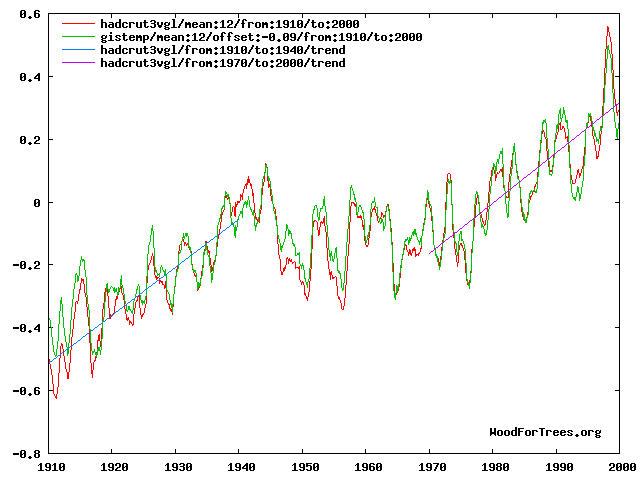
Fig. 7: Temperatures (yearly means) data 1910-2000, with trends for 1910-1940 and 1970-2000; source online plotter at Wood for Trees. Click to zoom in.
Apparently, the world is heating up after a known cold period ("Little Ice Age"). While it may overshoot now, at least the early warming from 1850-1950 is probably natural as it was natural to have the cooling that led to the little ice age... All this shows that it is possible to have a warming like we live now due to natural causes. And from the 0.8°C discussed above, apparently about half of it is potentially (probably, even) natural.
So what happened in 1950? This natural warming stopped. And coincidentally the anthropogenic forcings began and kept heating the world at a very similar rate (initially; then it accelerated at around 1975) as shown by IPCC:
It is possible, but it seems improbable (what a coincidence! Remember these are model results - we had no Earth without anthropogenic effects, so these are computations. If the models show cooling in absence of anthropogenic effects, it may be because they actually overestimate the anthropogenic effects which leads to assigning a cooling to natural factors in order to fit the model to the measures).
My feelings are better explained in another document, but can be summarized as:

Fig. 9: Zonal mean atmospheric temperature change from 1890 to 1999 (°C per century) as simulated by the PCM model from (a) solar forcing, (b) volcanoes, (c) well-mixed greenhouse gases, (d) tropospheric and stratospheric ozone changes, (e) direct sulphate aerosol forcing and (f) the sum of all forcings. Plot is from 1,000 hPa to 10 hPa (shown on left scale) and from 0 km to 30 km (shown on right). Source IPCC AR4 (2007); click on Figure for relevant chapter of IPCC report.
The measured data is given on Figure 10, and the qualitative difference in Figure 11:
This does not look like the fingerprints expected if the greenhouse gases would be the major drivers of the recent warming... or the models used by IPCC are quite wrong.
To keep it short, there are other natural phenomena that could explain the warming - of course this is disputed by the consensus view of IPCC. It may be solar changes, natural instabilities in the climate's chaotic system (PDO, AMO, ...) or cosmic rays. Whether one of those is credible I don't know, but something did that warming before 1950!
Let's assume that the Earth will be warming. Is that bad?
Of course, the question cannot be separated from a couple of tough questions:
Let's draw such a temperature range compared with several relevant ranges to get a better feeling of the magnitude:
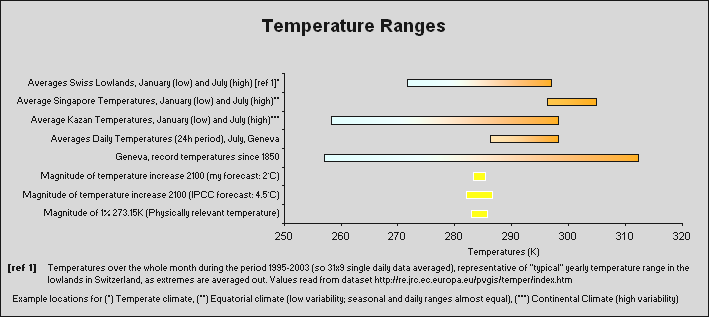
Figure 13: Comparision of temperature ranges. Yearly spans at 3 typical climate locations (tropical, temperate, continental) and daily span, record span for Geneva are compared to 2°C, 4.5°C and 1% of 273.15K, or 2.73°C. Sources: Wikipedia, MeteoSuisse
When seeing the picture above, it does not seem that the increase, even IPCC's 4.5°C will prove a significant change - what I mean is that my assumption of 2°C repesents a change of about 0.7% of the temperature (in Kelvin, the only scale relevant for physical/chemical/biological processes), it represent about 9% of the normal seasonal range of temperature or 8% of the normal daily temperature variation in July. Finally it is only 3% compared to extremes in Geneva. Of course it is even less important compared to average seasonal variations in continental climates (5%) and, while much more significative, still low compared to equatorial climate (20%).
That means for me that most plants and animals should not have enormous difficulties to adapt - they are used to much higher and quicker (daily and seasonal) changes. Obviously, food-relevant plants and animals will suffer even less as famers can adapt plant type and treatments to changing conditions.
Moreover it is interesting to see the "equivalent in distance" of these 2 or 4.5 degrees - i.e. how quickly are climate zone traveling? The average temperature by latitude is shown below:
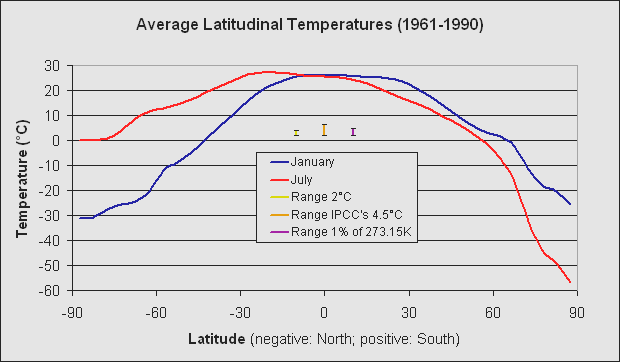
Figure 14: Temperature profile according to latitude, compared to 2°C, 4.5°C and 1% of 273.15K, or 2.73°C. The derviative of the curves indicate the gradiant °C/km. Source: CRU (Absolute)
Obviously, the derivative (or "degree change per kilometer") is not constant. The average (and the median) of the derivative (in absolute value - i.e. towards the pole is negative), both in January and July, is approximatively 5.5°C per 1000km. Obviously it is steeper at the poles (where most warming is expected) and quasi flat at the equator (where few warming is expected). So if we assume that the warming comes more or less constantly, for most of the earth the warming can be compensated by a walk towards the poles at a rate of 8.2km/year (IPCC's 4.5°C) or 3.6km/year in our 2°C assumption - in other words, 10 to 20 meters per day. So except for some coastal regions (swim if you want to go further!), most plants (I know they don't move - but over generations, they migrate) and animals (garden snails can do about 0.05km/h, they can cover the daily 10m within 12 minutes) should also be able to sustain this rate - remember most species live already in much broader regions, habitats usually extends much over the "distance equivalent" of climate change.
This long story should make it obvious: we are not afraid of the temperature rise, except perhaps in some few already inhospitable locations on Earth where a change may be fatal. So what's the problem? The problem is indirect climate modifications due to this temperature rise. We are afraid of possible changes in precipitations (new deserts), increases in natural catastrophes, and sea level rise.
So again, before making drastic changes in our civilization, such as cutting supply of cheap energy leading to drastic increase in food price (which is OK for fat, rich, Swiss, but is deadly for billions in emerging countries), a clearer picture of the real dangers would be in order.
[end of document - 01.04.2013; keywords list continues for the next questions...]
Interesting because show natural variability and consequences
Many hints that medieval time hotter than now.
Disputable proxies, don't fit actual temperatures
Disputable statistical methods
Difficult to believe "hottest year in a zillion year".
Warm = positive in history
Until when? Of course if actual warming keeps going, it will become unprecedented and negative, question of time
But more time, easier adaptation
Core of issue: doubling CO2 = 1 to 1.4°C according even IPCC
Becomes catatrophic in short term because of assumed strong positive feedbacks leading to 4-8°C per doubling
Positive feedback not very common in stable complex systems
Positive feedback apparently not compatible with past heating
If negative feedback or weak positive, we have centuries to react, i.e. can improve the science/models/technology before spending the big action money.
Still an agnostic on that one.
Gut feeling is nope, feedback negative/small and natural effect should revert one day.
IPCC scenarios based on huge reserves of fossil fuels. Probably cap before due to ressource limits.
But scientists say yes... they must have a reason (and I don't believe in any theory that suppose more than 2 people having to share a secret plan).
Who I am to say the specialists are wrong!
Precaution principle (but same computation as with insurance - take precaution for cost acceptable to cover the risk)
Oil gets rare, very important raw material for industry (from plastics to food and pharma), should not waste it just for energy
Acting today to develop renewable energies is a good investment on the long term.
The easiest is to answer the last question: Do not believe me. That's the whole point of skepticism. If you want to believe somebody at face value, please belive the IPCC, it's the opinion of many famous scientists and they are less prone to mistakes than one unknown guy like me.
Now on who I am. I am a chemical engineer, with a PhD degree. I worked in university in a group concerned with environmental protection (that was however not my personal research topic), so I got background 'green' information during lunch breaks. All-in-all, while I am certainly not qualified to assess all the environmental debates and models, I am at least likely to understand what is being spoken about.
I left university several years ago, and (Full disclosure:) I happen to be financed, since the takeover of my former employer, by a company that among many sectors, is also active in energy, more precisely in natural gas. But I swear they pay me only for my chemical engineering day job in R&D for a business unrelated to oil and gas, and not for my babble on my private website, didn't even got a raise for that! Regretfully no oil company proposed to give me money for publishing my website. I have no other conflicts of interests except some shares of an alpine train company, so more power to public transportation!
Politically, I am liberal (in the european sense), with a touch of green-liberal actually. You could see it for yourself in this essay in french... And by the way, now I do own a car and I am still slightly ashamed about it.
Side note: in blogs and online comments, "Peer-review" seems to be the holy grail. As a researcher, I wrote some peer-reviewed papers on unrelated topics and reviewed myself several papers, so while I don't have a better system to propose, I know "peer-reviewed" does not at all mean "correct" nor that the reviewer checked everything, hence I allow myself skepticism even in front of such papers!
Comments here are absolutely not moderated. That means usually whatever is typed in comes online. I may not share the views of the commenters, of course, and each commenter remains responsible if his contribution. If something is going awfully wrong, and something should really be deleted (e.g. racism, porn, spam...), thanks for dropping me a line!
1. Laurent Cavin, 02.05.2010, 16:25 [reply]
Thanks for your comments! Any info can help making a better-informed opinion, and that's the name of the game!
Greetings to all.
2. Fabio W., 23.07.2010, 23:35 [reply]
Please remember there are people flying thru the web without eagle eyes... plz make the graphs a bit bigger - and, to give some "fachlich" input: Questions 4 and 5 are misleading. Fact is, there might be a slow, and almost not stoppable process gearing up that could threaten the higher civilisations on this planet.... it is OUR civilisation that is at stake, with our technology, dependence on energy and highly productive, but on the other hand very sensitive food-delivering systems. So, whether CC is anthropogenic or not, whether a similar thing happend in history or not is just not important. There is only one question: whether we are ready to deal with a possibly-coming strong CC or not and what we are going to do.
3. Karry Oreilly, 05.12.2024, 05:10 [reply]
If you are looking for a reliable proxy solution, check out https://t.co/MBW7AlhT1Z .
Their residential proxies start at just $1.5 per IP/month-one of the cheapest on the market!
Why choose this? Check out the reasons below.
a. Millions of proxies for secure, fast browsing
b. ISP Proxies for top performance
c. Excellent Trustpilot Reviews
d. 7-day test plan - cancel anytime
Click here to sign up: https://t.co/MBW7AlhT1Z
Thank you,
Karry Oreilly
Leave a comment:
State of today: going forward, but still mostly keywords. Will be completed over the next months...
"Today" is now over one decade ago. Since then, lot's of new evidence has come, which should change the conclusions/reflections. This page is left as is but does not represent anymore the state of knowledge!
| Content |
Question 1: Is the Earth actually warming?
Question 2: Do anthropogenic factors contribute to global warming?
Question 3: Do both answers above terminate the debate (aka The Science Is Settled)?
Question 4: Is the whole warming due to anthropogenic causes, mostly CO2 (with no other significant natural causes)?
Question 5: Is a reasonable warming actually bad?
Question 6: Is the current climate unprecedented in history?
Question 7: Are the climate feedbacks strongly positive?
Question 8: Should we expect catastrophic antropogenic climate change?
Question 9: Should we take measures to reduce green house gases?
Extra: Who are you, and what qualifications do you have? Should I believe you?
Comments
| Question 1: Is the Earth actually warming? | ||||
| Very Likely | Likely | Don't know | Likely Not | Very Likely Not |
Interestingly, it is not at all obvious to answer the basic question: what is the temperature on earth? While we can ponctually measure temperature very precisely, we can only guess the temperatures at locations where no thermometer is - right now - measuring.
Earth not being covered by thermometers, there is some form of uncertainty on the data. Several scientific efforts are made to get an approximate measure of the average temperature on earth. Two are mostly based on weather stations and ocean buoys (GISS from the NASA in the US and HADCRUT3 from UEA and MetOffice in the UK). The other two are based on satellite measurements (UAH and RSS, both in the US).
In the following figure, the data (monthly) from those four institutes are plotted:

Fig. 1: Raw temperature data 1860-present, monthly; source online plotter at Wood for Trees. Click to zoom in with the latest values.
We can see that based on those data, the fit between methods is quite good; although the methods are quite different, the satallites and the weather station agrees. The picture must therefore be quite correct! A more complete discussion is available on Earth Temperature.
But that is even confirmed by several other indicators. For instance the Sea Level, which increases as the temperature increases (due partly because of melting snow and ice, but mostly because of the thermal expension of the water as the ocean temperature increases):

Fig. 2: Sea level with uncertainty bars; source at http://www.pol.ac.uk/psmsl/author_archive/church_white/. Click to zoom in.
Similary, the glaciers have been melting dramatically worldwide as can be seen on the summary picture below:
So I guess everything is telling the same story. The Earth is warming. Using Figure 1, we can estimate that the warming was about 0.8°C since 1900.
Note: There is many discussions about potential errors in the measurements of the temperature (bad located measuring stations, UHI). In my opinion, the fact that the satellites (that may also have errors, but not the same) and the ground measurements agree so well indicates that the errors are efficiently dealt with by the UEA and MetOffice.
| Question 2: Do anthropogenic factors contribute to global warming? | ||||
| Very Likely | Likely | Don't know | Likely Not | Very Likely Not |
The temperature of the Earth is the current state resulting of many energy flows - coming from very different physical processes and hence with different dependance to the temperature - which tend to come to an equilibrium.
To give an example, consider a fontain with a source and an outlet. The level in the fountain will increase until the input (source) is equal to the output (flow through the outlet). If the source increases its flow, the level increases until equilibrium (higher level is higher pressure on the outlet, hence higher outgoing flow). What if the temperature increases? Some water will evaporate, thus leading to a higher rate of "output" - even if the "phenomena" is different - thus decreasing the level. So even if ultimately it has an equilibrium where input = output, changes in conditions impact the level in the fountain. It is similar with temperature and energy flows.
The main energy flows are sketched in the next figure:
So if any of those flows is modified, inbalances will modify the temperature tending to a new equilibrium. The question is whether humankind can modify one of those flows significantly.
The question is not whether we can modify those flows at all, because this is obvious. For instance by burning wood, humans make a new source of heat. Or by building a parking lot (i.e. removing vegetations), we decrease the Evapo-transpiration (but perhaps we increase the thermals?). But are those changes significant, or are they lost in the "noise", i.e. the inherant changes of the system which is never perfectly at equilibrium because of it's complexity (e.g. more or less clouds change the flow of short waves reflected by them).
The values in Figure 4 are given in W/m2. This makes, for instance, an energy output of the surface of 2.66·1017 W for the whole surface of Earth. Now the overall energy demand (whole mankind) is 1.504·1013 W. Assuming the whole energy demand radiates heat (which is of course completely wrong as the energy also delivers a service, such as moving a car) this amounts to 0.0056% of the surface's energy output. So I guess that may answer this particular question - the energy use by humankind is probably not affecting directly very much the temperature (i.e. the heat from your BBQ or your floor heating is not heating Earth. The CO2 resulting from your burning coal or gas is another question, of course).
The IPCC considers that our other example (land use - building a parking lot) does have an impact on the climate (see Albedo below). And list several other effects that do influence the temperature, positively (warmer) as well as negatively (cooler):
The balance is however significantly positive (warmer). Note that the uncertainty bars go from 0.5 to 2.5 W/m2, or from 1 to 5, which shows that determining those numbers is not easy. The Figure 5 shows the by far largest forcings are due to greenhouse gases. But also Figure 4 shows that the largest energy flows are due to greenhouse gases. This is not new science - it is well known that without greenhouse gases, the Earth would be rather inhospitable for life and much cooler.
As it happens, one of those greenhouse gas is CO2, which is nothing else as the product of the combustion of organic material (containing Carbon). And this incudes sugar (when we breath) as well as oil, gas or coal. And we must admit that since the industrial revolution, the energy production did put a lot of CO2 in the air!
According to CDIAC, the anthropogenic emissions of carbon-dioxide since 1751 sum at around 3.3·1014 kg_Carbon. The present weight of carbon-dioxide in the atmosphere is approximatively 8.2·1014 kg_Carbon (based on a concentration of 383 ppmv and an estimation of the weight of the atmosphere). That's 40%. Of course not all the CO2 emitted remains in the atmosphere, by far. A part of it is direclty used by plants that grow faster. Another part is probably dissolved in the oceans. Apparently the view of IPCC is that about 40% of the emissions remain in the atmosphere (on short term).
Taking this into account, in the year 2006 for instance the amount of carbon-dioxide released by manking should be enough to increase the concentration in the air by about 1.6ppm! Based on CO2 concentrations of about 300ppm before industrialization, and a concentration of about 400ppm now (coincidentally an increase of about 40%), that means with a constant rate a doubling of concentration in about a century - but the rate is of course not constant but increasing as can be seen in Figure 6:
All-in-all we have seen several effects that humankind can have on the temperature - there are many others such as creating new clouds which depending on the altitude may warm or cool the planet. In particular the greenhouse gas - CO2 - is produced in significant amount and does have a proven temperature effect. So, while the size of the effect is not proven yet, I guess without doubts manking has an effect on the climate.
| Question 3: Do both answers above terminate the debate? | ||||
| Very Likely | Likely | Don't know | Likely Not | Very Likely Not |
So that's it, isn't it?
Humans have an effect on temperature. Temperatures are increasing. The science is settled! Let's stop burning oil for good at once! All further discussion is a crime as the situation is getting worse while we discuss. Doubt is ecocide and skeptics should be shot.
Of course I am joking, but these are conclusions that are not unheared of. Quite often that's how a person skeptical about the AGW (anthropogenic global warming) will be answered... I have to admit I would also have used a polite and slightly more open-ended version of it myself, before I began informing myself in more details.
Of course the Science is not settled, all serious scientists will agree on that. The science is basically never settled. The systems are very complex, chaotic, and experiments are close to impossible (have a second Earth to lend me for a controlled experiment?). So while part of it (as mentioned above: Earth is warming, CO2 is a greenhouse gas) may be virtually certain, some may remain a bit more uncertain. For instance:
Why are those questions important?
We are asked to make a drastic choice for our future, based on a theory that if we don't change, we run forward to a catastrophe... But hey!, we risk irreversible damage to our only planet! Is it ethical to risk the planet of our children just to keep our standard of living?
Some consider that the precautionary principle dictates that we act resolutely even in presence of uncertainty, because of this irreversible damage. Well, I guess we should invest every penny in building a starfleet in case some mean man-eating extraterrestrials come to kick and eat us. Nobody can prove it cannot happen and it would be a major catastrophe as well. Why don't we? Because we consider the probability to be too small. So it is legitimate to insist on obtaining probabilities for global warming as well.
Probabilities may not be necessary when the alternative is almost free. Like: it may rain, let's be on the safe side and take an umbrella - carrying a foldable umbrella in a bag is not a significant cost factor (but you may renounce it if you go jogging because the umbrella will be more a pain). But when it is not free, but costly (such as write off several trillions of dollar of energy and production infrastructure) then like an insurance, one begins to compute probabilities based on the best available information and not base decision on sheer possibilities.
That's why those questions are important!
Deciding on sheer possibilities instead of probabilities would be irresponsible, because the ethical question goes further: Is it ethical to force a billion of people to stay in poverty in order to avoid a small, non-catastrophic, warming? China, India and many other countries are getting out of poverty and famine risks thanks mostly to cheap energy (leading to cheaper food, and hence means to consume more and get educated, ths entraining the whole economy upwards) - force them to renounce it and they will need that much more time to fully develop (with that much more deaths due to poor health systems and other consequences of poverty). The precautionary principle tells us not to risk the world's economy and the future of billions as long as the risk is not clear and proven.
Finally the decision is not black and white. If we don't react today, we can react tomorrow - actually we will be richer tomorrow and know more technologies to react at lower costs. And more: if this warming is actually due to nature mostly, we should be ready to react and bring more A/C units online, so scraping the cheap energy infrastructure would actually put us in higher risk as our capacities of adapation would decrease. So why act today? The only reason would be if there is a significant risk of irreparable catastrophes in absence of immediate action... does it look like it? Do we see major indicators that show a runaway process? I don't know... On Figures 1, 2, 3, and 6, everything seems smooth for now... so that would need to be proven!
I will conclude this question by a citation that, as a chemical engineer, I find especially striking:
| Is there a wider lesson here for engineers? We are often told that the "Science is settled". But engineers, of all people, know that, even if the "science is settled", the engineering work may have just begun. One would hardly derive the parameters for a chemical process from an article in Nature without an engineering feasibility study. The most critical question in climate is the estimation of a parameter - is the sensitivity of climate to doubled CO2 1.5, 2.5 or 3.5°C? Or could it be 6°C or 0.6°C? In some ways, the estimation of such parameters through the development of complicated computer models is reminiscent of activities carried out by engineers. One important difference is that climate scientists typically report their results in highly summarized form in journals like Nature, rather than in the 1000-page or 2000-page engineering studies that an aerospace engineering enterprise would produce. - Stephen McIntyre, May 16, 2008, Speech at Ohio State University |
| Question 4: Is the whole warming due to anthropogenic causes, mostly CO2 (with no other significant natural causes)? | ||||
| Very Likely | Likely | Don't know | Likely Not | Very Likely Not |
We have seen in the first question that Earth was very likely warming. We got an estimate of 0.8°C since 1900.
Wait a minute. Since 1900? But as we have seen on Figure 6, the anthropogenic emissions of CO2 have really started their rocket-like rise in 1950. Why did it all begin half a century earlier? Or even worse when looking at the other figures, like the sea level or the glaciers, it seems that the trend is older than that. 1870 or even 1850 marks the beginning of this warming trend. Even the CO2 was actually rising since the XIXth century (degasing of oceans, also an indicator of warming).
Even the rate of warming was very similar, according to GISS and CRU, in both 30-year periods 1910-1940 and 1970-2000, as can be seen on Figure 7. And according to IPCC, the first rise is due to natural causes, and the second to anthropogenic ones...

Fig. 7: Temperatures (yearly means) data 1910-2000, with trends for 1910-1940 and 1970-2000; source online plotter at Wood for Trees. Click to zoom in.
Apparently, the world is heating up after a known cold period ("Little Ice Age"). While it may overshoot now, at least the early warming from 1850-1950 is probably natural as it was natural to have the cooling that led to the little ice age... All this shows that it is possible to have a warming like we live now due to natural causes. And from the 0.8°C discussed above, apparently about half of it is potentially (probably, even) natural.
So what happened in 1950? This natural warming stopped. And coincidentally the anthropogenic forcings began and kept heating the world at a very similar rate (initially; then it accelerated at around 1975) as shown by IPCC:
It is possible, but it seems improbable (what a coincidence! Remember these are model results - we had no Earth without anthropogenic effects, so these are computations. If the models show cooling in absence of anthropogenic effects, it may be because they actually overestimate the anthropogenic effects which leads to assigning a cooling to natural factors in order to fit the model to the measures).
My feelings are better explained in another document, but can be summarized as:
- The temperature increase must be partly due to "natural" reasons independant from the industrialization and CO2, and this represent around half of the measured warming.
- The temperature increase is apparently accelerating.
- Pending more knowledge, we can assume that the acceleration is caused by the undisputable greenhouse effect due to the anthropogenic CO2 (indisputable because while we can discuss about the magnitude of the effect, the existence of the effect is absolutely proven beyond any doubt). Other factors may play also a role

Fig. 9: Zonal mean atmospheric temperature change from 1890 to 1999 (°C per century) as simulated by the PCM model from (a) solar forcing, (b) volcanoes, (c) well-mixed greenhouse gases, (d) tropospheric and stratospheric ozone changes, (e) direct sulphate aerosol forcing and (f) the sum of all forcings. Plot is from 1,000 hPa to 10 hPa (shown on left scale) and from 0 km to 30 km (shown on right). Source IPCC AR4 (2007); click on Figure for relevant chapter of IPCC report.
The measured data is given on Figure 10, and the qualitative difference in Figure 11:
This does not look like the fingerprints expected if the greenhouse gases would be the major drivers of the recent warming... or the models used by IPCC are quite wrong.
To keep it short, there are other natural phenomena that could explain the warming - of course this is disputed by the consensus view of IPCC. It may be solar changes, natural instabilities in the climate's chaotic system (PDO, AMO, ...) or cosmic rays. Whether one of those is credible I don't know, but something did that warming before 1950!
| Question 5: Is a reasonable warming actually bad? | ||||
| Very Likely | Likely | Don't know | Likely Not | Very Likely Not |
Let's assume that the Earth will be warming. Is that bad?
Of course, the question cannot be separated from a couple of tough questions:
- How much? The question is far from settled as we discussed above, and is critical for any meaningful discussion: Obviously, warming of 100°C is bad - oceans are boiling. As another end, a global warming of 1°C happened already during the XXth century and apparently did not end the world as we know it. So what? I personaly assume a moderate warming of 2°C until 2100. This is below estimates of the IPCC (therefore we will keep in mind IPCC's 4.5°C in the following), but represent in my opinion a reasonable fit (with safety margin: the exponential fit below show +1.5°C starting today) of the historical data:
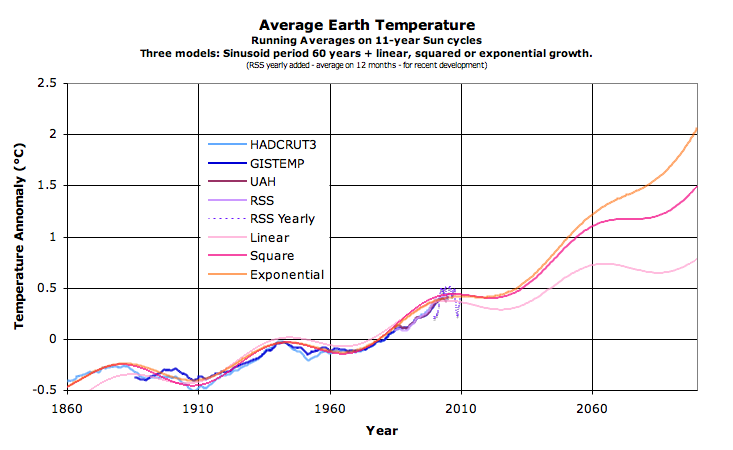
Figure 12: Fit of several models with the measured temperatures, and extrapolations to 2100. See a discussion of the models and the (low) confidence in them.
- When? The danger with averages is that one do not know when it changes. Assume we get +10°C in winter nights and -1°C in summer days - the only people complaining would be the skiers and the wintersport industry. For the rest of the world, including probably most plants and animals, it would make the world a more confortable place to be. But if it is the opposite, it may be less funny.
Literature is unclear on this topic. Long term global trends apparently show that nighttime temperature rise quicker than daytime temperatures (hence reducing the intraday range without increasing dramatically the high end). Some others show that in the last decades this trend changes and the intraday range remain constant with a shift to warmer temperatures. - Where? Similar to when, I guess adding a couple of degrees in a hot desert may kill the few remaining lifeforms there. But several degrees more in Greenland will certainly improve the life for humans, animals and plants there (I know - sea level issues. Keep reading!). In this regards, it seems clear (see "signatures" above) that the trend should be higher where it is cold (poles) and lower where it is hot (tropics) - that means probably it will be "less" negative impact as warming comes preferably where it is needed.
Let's draw such a temperature range compared with several relevant ranges to get a better feeling of the magnitude:

Figure 13: Comparision of temperature ranges. Yearly spans at 3 typical climate locations (tropical, temperate, continental) and daily span, record span for Geneva are compared to 2°C, 4.5°C and 1% of 273.15K, or 2.73°C. Sources: Wikipedia, MeteoSuisse
When seeing the picture above, it does not seem that the increase, even IPCC's 4.5°C will prove a significant change - what I mean is that my assumption of 2°C repesents a change of about 0.7% of the temperature (in Kelvin, the only scale relevant for physical/chemical/biological processes), it represent about 9% of the normal seasonal range of temperature or 8% of the normal daily temperature variation in July. Finally it is only 3% compared to extremes in Geneva. Of course it is even less important compared to average seasonal variations in continental climates (5%) and, while much more significative, still low compared to equatorial climate (20%).
That means for me that most plants and animals should not have enormous difficulties to adapt - they are used to much higher and quicker (daily and seasonal) changes. Obviously, food-relevant plants and animals will suffer even less as famers can adapt plant type and treatments to changing conditions.
Moreover it is interesting to see the "equivalent in distance" of these 2 or 4.5 degrees - i.e. how quickly are climate zone traveling? The average temperature by latitude is shown below:

Figure 14: Temperature profile according to latitude, compared to 2°C, 4.5°C and 1% of 273.15K, or 2.73°C. The derviative of the curves indicate the gradiant °C/km. Source: CRU (Absolute)
Obviously, the derivative (or "degree change per kilometer") is not constant. The average (and the median) of the derivative (in absolute value - i.e. towards the pole is negative), both in January and July, is approximatively 5.5°C per 1000km. Obviously it is steeper at the poles (where most warming is expected) and quasi flat at the equator (where few warming is expected). So if we assume that the warming comes more or less constantly, for most of the earth the warming can be compensated by a walk towards the poles at a rate of 8.2km/year (IPCC's 4.5°C) or 3.6km/year in our 2°C assumption - in other words, 10 to 20 meters per day. So except for some coastal regions (swim if you want to go further!), most plants (I know they don't move - but over generations, they migrate) and animals (garden snails can do about 0.05km/h, they can cover the daily 10m within 12 minutes) should also be able to sustain this rate - remember most species live already in much broader regions, habitats usually extends much over the "distance equivalent" of climate change.
This long story should make it obvious: we are not afraid of the temperature rise, except perhaps in some few already inhospitable locations on Earth where a change may be fatal. So what's the problem? The problem is indirect climate modifications due to this temperature rise. We are afraid of possible changes in precipitations (new deserts), increases in natural catastrophes, and sea level rise.
- Precipitations
If the climate system is changing, the pattern of rain may be changing. Statistically, higher temperatures means more evaporation. Higher evaporation leads to more precipitations. So a slight acceleration (remember - the change is about 1% in temperature on the relevant scale) of the hydrological cycle. Where it will rain is more weather than climate, and we are not so good at predicting states of a chaotic system like weather. We can assume there will be winners and loosers. Some will get more evaporation but not more rain and have problems, other may get the rain they need to make arid landscapes green. Will it be good or bad on average?
Today there are also winners and loosers. So changes will make some people happy, and some other unhappy, and who's winning is unclear. The changes during the XXth century are shown below (warming ca 0.8%deg;C) - more warming will probably generate a similarly complex picture:
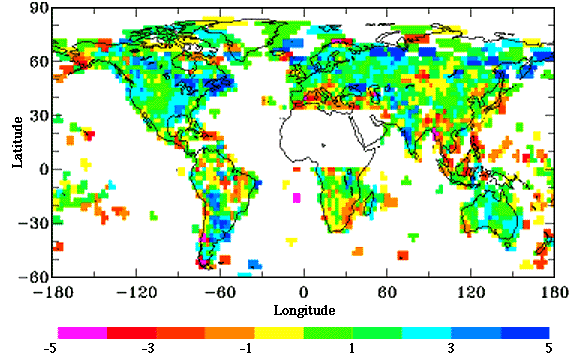
Figure 15: Trends in precipitations over the XXth century. Source: GISS. The scale is unclear is can be mm/century or %/century, but the colour shows at least where it increases and where it decreases. The northern half of Africa is omitted because its dominant long-term trend is the Sahelian drought of the past few decades, a phenomenon distinct from the century-long trends seen elsewhere in the world.
In absence of clear picture, and knowing the climate is anyway evolving, it is really impossible to see whether potential anthropogenic climate change will modify the system for the better or for the worse... - Natural Catastrophes
The first direct consequence of warming should be more heat waves; extreme heat cause people to die as could be seen during the European 2003 Heat Wave. Most death are however technically easily avoidable if the living standards allow it (provide enough support in form of air-conditioned rooms and drinks to the elderly).
Directly, of course, some natural catastrophes will be reduced by warming. Less people will die because of extreme cold, or in car accidents due to ice on the roads...
But more complex are the "real" catastrophes - hurricanes, floods, droughts - that are due to whether and may be hence impacted by global warming. The logical basis is: more temperature is more energy in the system. More energy means more extreme events, or more (detructive) energy in those events. Munich Re published a plot of natural catastrophes in the last years:
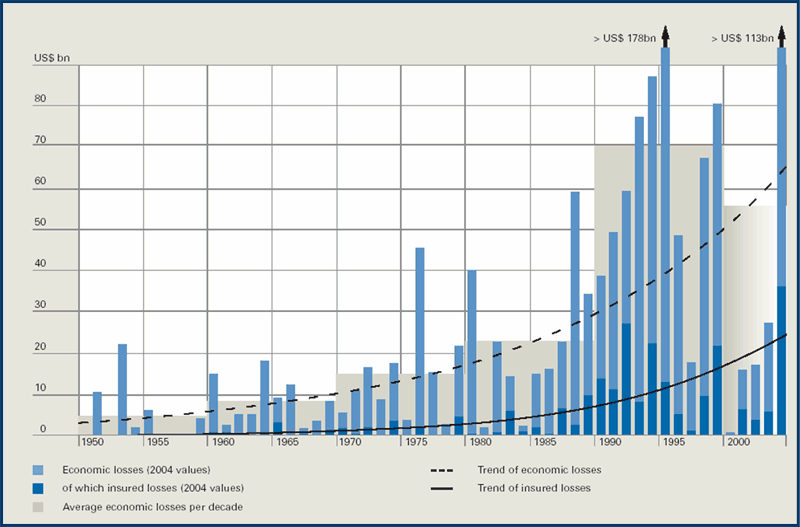
Figure 16: Trends in economic losses due to catastrophic events over the second half of the XXth century. Click for full size. Source: MünchenRe.
The trend is obviously going upwards. But of course, population increased, property value increased, information increased. Is the trend actually a trend in number and severity of events, or does it just mirror the fact that more richer people have more to loose from the same events?
According again to Munich Re, since 1950 the contribution of weather related events like windstorms and floods amounts to 69% of all economic (38% windstorm, 25% floods, 6% other weather related events) losses. The trend of the global numbers of great natural catastrophes since 1950 shows a steep increase in weather related disasters from about one event in the 1950s to about 5 in recent decades while geophysically-caused disasters (earthquakes, tsunamis, volcano eruptions) have increased from one to less than 2 in the same time. This difference 5:2 would speak for a real worsening of the situation.
But, funnily also based on a study by Munich Re, we can see that the cost of disasters is actually decreasing compared to GDP:
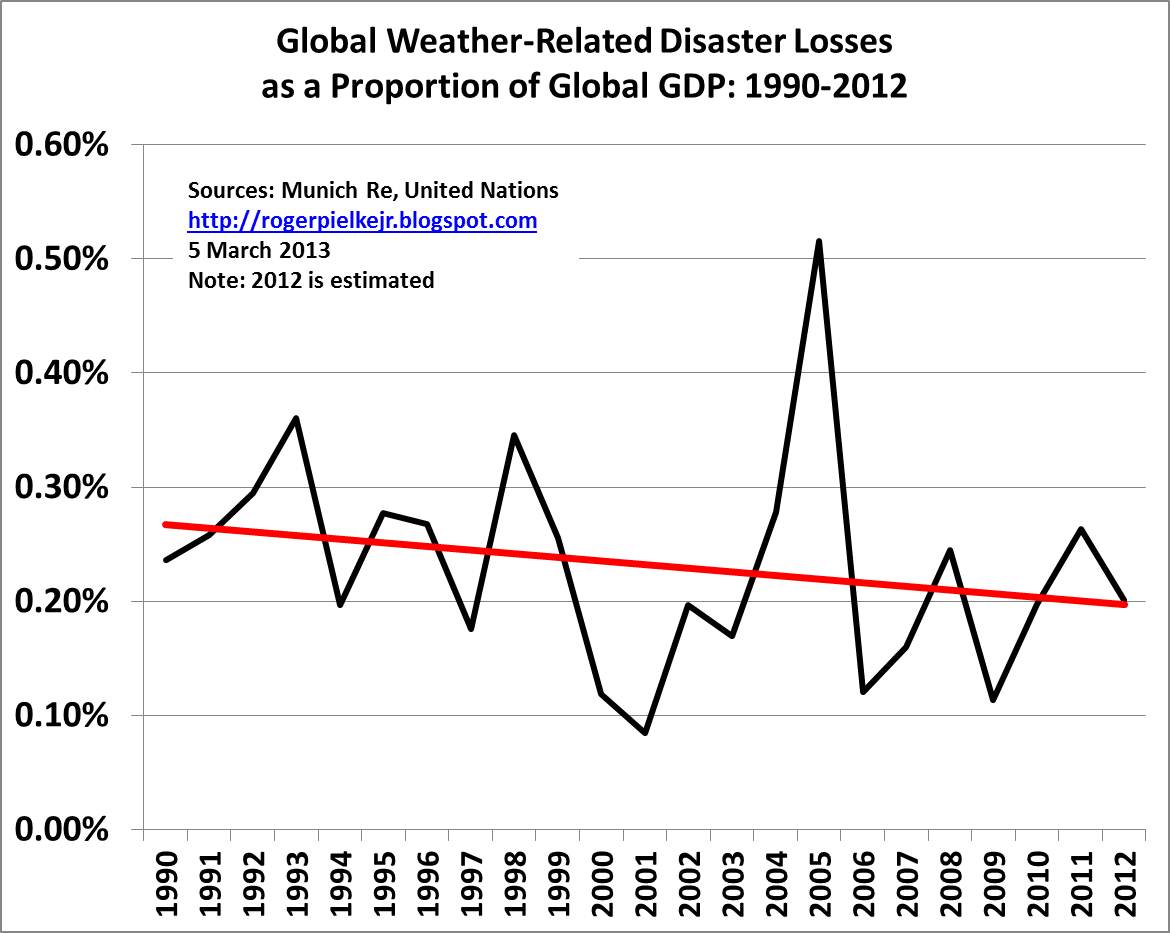
Figure 17: Trends in economic losses compared to GDP, compiled by Prof. Pilke. Click on the picture for original location. Source: MünchenRe, UN.
Similarly, a recent meta-study (local copy) conducted the analysis of recent quantitative studies on past increases in weather disaster losses and the role of anthropogenic climate change. The analyses show that although economic losses from weather related hazards have increased, anthropogenic climate change so far did not have a significant impact on losses from natural disasters. The observed loss increase is caused primarily by increasing exposure and value of capital at risk.
So what? Again, we have no definitive answers... - Sea level rise
Most of Earth's water is obviously in the oceans, or circulating in the water cycle of evaporation/rain/rivers/sea/evaporation... however, some serious amount of water is actually "captured" in form of ice (which is not flowing back to ocean, hence does not contribute to their level). Note that this is only the case for land-based glaciers. Indeed the sea-based glaciers (north pole) is already weighting on the ocean and hence participating to their level.
Moreover the ocean level is based on the density of water (you have to store a certain amount. The lower the density, the more room you need). Density of water (as for almost everything) is linked to its temperature: when it gets warmer, the density becomes smaller, hence the ocean need more room. This so-called thermal expansion is a major contributor to the sea-level rise.
We have already seen above the past evolution of sea-level:

Fig. 18: Sea level with uncertainty bars; source at http://www.pol.ac.uk/psmsl/author_archive/church_white/. Click to zoom in.
The sea level rise seems mostly constant and as expected linked with the temperature rise, if much smoother (heat capacity of water is massively higher as the one of air).
So is it a problem? IPCC estimates the sea-level rise until 2100 at 18-59 cm. This is up to the double of what we have lived without problems in the XXth century. Note that this should be compared to tidal effects of 20cm to 10m depending on the locations, or to sea-level differences due to wind or air pressure (centimeters to meters). So the average rise would be in the same order of magnitude (or significantly smaller) than today's daily change. In other words, any problems due to the long term change is most probably already a problem today when exceptional tides are coming.
I assume in most location we should be able to cope with it, but there may be locations that are problematic.
Disruptive changes could be due to the melting of large land-based glaciers; such as:- Groenland (total melt would lead to 7.2m sea-level rise),
- Antartica (total melt would lead to 61.1m sea-level rise),
- Mountain glaciers all over the world (very small in comparison. The worst happened already anyway, based on Fig 3).
So again, before making drastic changes in our civilization, such as cutting supply of cheap energy leading to drastic increase in food price (which is OK for fat, rich, Swiss, but is deadly for billions in emerging countries), a clearer picture of the real dangers would be in order.
[end of document - 01.04.2013; keywords list continues for the next questions...]
| Question 6: Is the current climate unprecedented in history? | ||||
| Very Likely | Likely | Don't know | Likely Not | Very Likely Not |
| Question 7: Are the climate feedbacks strongly positive? | ||||
| Very Likely | Likely | Don't know | Likely Not | Very Likely Not |
| Question 8: Should we expect catastrophic antropogenic climate change? | ||||
| Very Likely | Likely | Don't know | Likely Not | Very Likely Not |
| Question 9: Should we take measures to reduce green house gases? | ||||
| Very Likely | Likely | Don't know | Likely Not | Very Likely Not |
| Extra: Who are you, and what qualifications do you have? Should I believe you? |
The easiest is to answer the last question: Do not believe me. That's the whole point of skepticism. If you want to believe somebody at face value, please belive the IPCC, it's the opinion of many famous scientists and they are less prone to mistakes than one unknown guy like me.
Now on who I am. I am a chemical engineer, with a PhD degree. I worked in university in a group concerned with environmental protection (that was however not my personal research topic), so I got background 'green' information during lunch breaks. All-in-all, while I am certainly not qualified to assess all the environmental debates and models, I am at least likely to understand what is being spoken about.
I left university several years ago, and (Full disclosure:) I happen to be financed, since the takeover of my former employer, by a company that among many sectors, is also active in energy, more precisely in natural gas. But I swear they pay me only for my chemical engineering day job in R&D for a business unrelated to oil and gas, and not for my babble on my private website, didn't even got a raise for that! Regretfully no oil company proposed to give me money for publishing my website. I have no other conflicts of interests except some shares of an alpine train company, so more power to public transportation!
Politically, I am liberal (in the european sense), with a touch of green-liberal actually. You could see it for yourself in this essay in french... And by the way, now I do own a car and I am still slightly ashamed about it.
Side note: in blogs and online comments, "Peer-review" seems to be the holy grail. As a researcher, I wrote some peer-reviewed papers on unrelated topics and reviewed myself several papers, so while I don't have a better system to propose, I know "peer-reviewed" does not at all mean "correct" nor that the reviewer checked everything, hence I allow myself skepticism even in front of such papers!
| Comments |
Comments here are absolutely not moderated. That means usually whatever is typed in comes online. I may not share the views of the commenters, of course, and each commenter remains responsible if his contribution. If something is going awfully wrong, and something should really be deleted (e.g. racism, porn, spam...), thanks for dropping me a line!
1. Laurent Cavin, 02.05.2010, 16:25 [reply]
Thanks for your comments! Any info can help making a better-informed opinion, and that's the name of the game!
Greetings to all.
2. Fabio W., 23.07.2010, 23:35 [reply]
Please remember there are people flying thru the web without eagle eyes... plz make the graphs a bit bigger - and, to give some "fachlich" input: Questions 4 and 5 are misleading. Fact is, there might be a slow, and almost not stoppable process gearing up that could threaten the higher civilisations on this planet.... it is OUR civilisation that is at stake, with our technology, dependence on energy and highly productive, but on the other hand very sensitive food-delivering systems. So, whether CC is anthropogenic or not, whether a similar thing happend in history or not is just not important. There is only one question: whether we are ready to deal with a possibly-coming strong CC or not and what we are going to do.
3. Karry Oreilly, 05.12.2024, 05:10 [reply]
If you are looking for a reliable proxy solution, check out https://t.co/MBW7AlhT1Z .
Their residential proxies start at just $1.5 per IP/month-one of the cheapest on the market!
Why choose this? Check out the reasons below.
a. Millions of proxies for secure, fast browsing
b. ISP Proxies for top performance
c. Excellent Trustpilot Reviews
d. 7-day test plan - cancel anytime
Click here to sign up: https://t.co/MBW7AlhT1Z
Thank you,
Karry Oreilly
Leave a comment:








